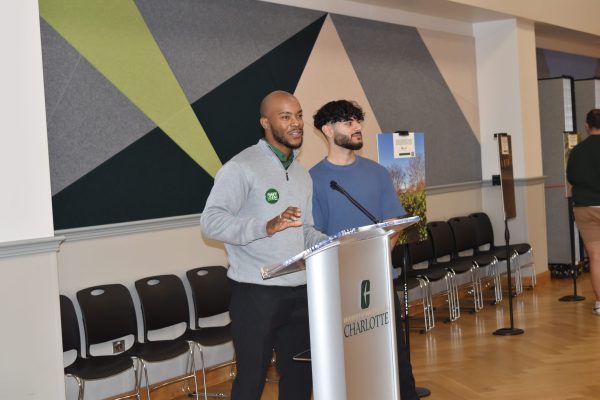Lorenzo Hopper on why graduating first-gen students should shoot for Excellence Awards

Lorenzo Hopper, assistant professor in the Department of Epidemiology and Community Health, is a major supporter of first-generation students at Charlotte. A first-generation student himself, Hopper has been involved with the First Gen Niners student organization as a faculty advisor since 2020 and Office of Transition and Success (which developed into Forty-Niner First Generation Support) since 2023.
Hopper, who has conducted research on the first-generation experience, stresses the importance of promoting first-generation students and establishing a blueprint for first-gen success at Charlotte. Students who are graduating this spring can apply for the First-Generation Excellence Awards through Monday, Feb. 24.
You were a first-generation college student. What is it like mentoring today’s first-gen students, especially as they enter the University?
I try to take an asset-based lens, which is all about unlocking untapped potential. The reason why I invest so much time and energy in first-generation students is because I think there’s so much potential for students, despite the unique challenges they face.
What F1GS is doing with these excellence awards is recognizing the potential that first-gen students have and honoring their persistence. These students are doing amazing things: graduating with a 4.0 GPA in four years, thriving in the classroom and building community initiatives.
I think it’s important to give graduating first-gen students recognition for the impact that they’ve had on our Charlotte community and to motivate younger first-gen students.
What is the Golden Achievement: Academic Excellence Award, and what does it represent to you?
This award recognizes first-gen Niners who exemplify outstanding academic achievement, which is demonstrated through GPA scores and success in the classroom. I consider this a prestigious award because students are up against so many things throughout their years here. To be able to overcome that, prioritize their coursework along the way, maintain a high GPA and demonstrate that commitment to their academics — I think it’s something to be applauded.
What is the Community Impact Award, and what does it represent to you?
Research indicates that when first-gen students volunteer in their community they often have much better academic and personal outcomes. So, part of what first-gen Niners did is create opportunities at the Jamil Niner Student Pantry for students to volunteer.
We saw students doing a lot of work in the UNC Charlotte community, but also in the Charlotte community, so we wanted to highlight that work. Through this award, we recognize first-gen Niners who demonstrate outstanding commitment to sustained community engagement and service. They’re not only volunteering their time, they’re creating community initiatives that are impactful.
Why would you encourage first-generation students to apply for these awards?
Students may not think what they’re doing is top tier, but I think applying for these awards is important because it can be a motivating tool. Their story needs to be heard, and their work needs to be celebrated. We have a limited number of students who actually get the awards, but all of the nominees need to be acknowledged. I encourage all graduating first-gen students to apply for these awards and allow themselves to be celebrated.
What are some stand out examples of community impact that you’ve seen?
There have been so many. We had the chance to pilot these awards last semester, and I can remember a student who was really passionate about recycling, so they built a program to educate the Charlotte community on sustainability and created machines to assist with recycling over 200 pounds of plastic. There was another student who created a program to donate hundreds of books to local elementary schools. I’m working with students now, some were first-generation and were passionate about health and wellness. They’re engaging in preconception peer education on campus.This award is meant to amplify and hear those stories.
How have you seen the first-gen experience evolve from the time that you were entering college until now?
I think that the first-gen experience has certainly evolved since I entered college in 2006, both in terms of support systems and the way the experience is understood by institutions. I’m seeing universities having more dedicated offices and efforts to support their first-gen students. Neither First Gen Niners nor F1GS existed when I arrived here, but now they do, and now, we have a whole week of first-gen events in the fall and graduation celebrations in the spring. I think we have a lot of momentum in terms of meeting this evolution.
Is there anything else you want to add?
I just think it’s so important to give Chris Walls, Shayauna Newsome and the rest of the committee their flowers for initiating F1GS and really investing in this effort. I really want to encourage faculty to come out to these student events and celebrations, because I think creating that sense of community is so important. If you are interested in fostering visibility, connection and mentorship for our first-gen niners please consider joining our First Gen Faculty and Staff Directory.